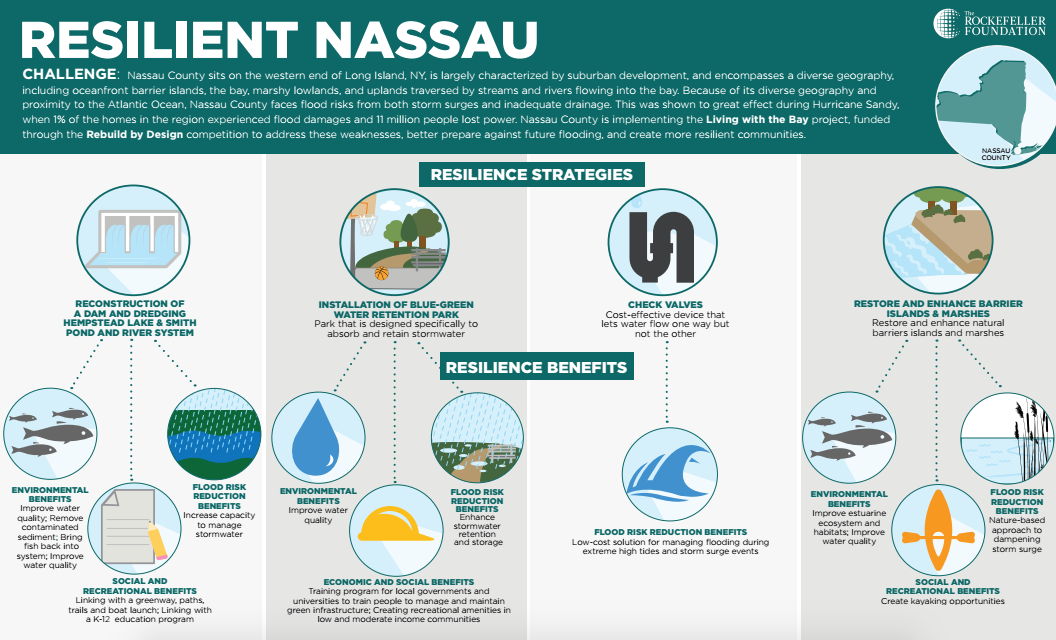Learning From Resilient Design Projects in the Wake of Superstorm Sandy

Gov. Andrew Cuomo, Sen. Kirsten Gillibrand, D-NY, Sen. Charles Schumer, D-NY, and local officials took a flight over New York City, Nassau and Westchester counties to get an assessment of damages from Superstorm Sandy. Mark Lennihan / AP Photo
Connecting state and local government leaders
A new report spearheaded by the Georgetown Climate Center explores the funding, legal and land-use barriers to local resilience efforts and why they're to be expected at such an experimental stage.
Nassau County, New York, located on Long Island, saw 1 percent of homes flood and 1.1 million residents lose power, when Superstorm Sandy hit in late October 2012.
Nassau’s barrier islands, marshy lowlands and streams and rivers flowing to its bayfront render it susceptible to flooding from storms and poor drainage.
So when Rebuild by Design, a collaborative partnership between the Obama administration and The Rockefeller Foundation, offered to lend resilient design expertise to the county’s recovery effort, Nassau jumped at the opportunity and the Living with the Bay project was born.
“These large-scale, multi-benefits projects are trying to solve multiple community challenges and require unprecedented coordination across city agencies and other stakeholders like the New York City Housing Authority, utilities and also state and federal government,” said Jessica Grannis, Georgetown Climate Center adaptation program manager. “They have to get beyond silos.
Grannis was the lead author on the new report “Rebuilding with Resilience”, analyzing the legal and policy challenges experienced by the six innovative RBD projects and using them as test cases to scale elsewhere.
Nassau was a standout because of its watershed approach involving the reconstruction of a dam, dredging of local waterways, installation of a water retention park, use of one-way check valves, and enhancement of barrier islands and marshes. The county looked at its entire landscape to figure out where the most cost-effective mechanisms should go, Grannis said.

Scarcity of funds was common hurdle with all the projects, according to the report, requiring jurisdictions to reconsider project design and their use of resources.
The RBD competition’s 10 interdisciplinary teams began by traversing the New York-New Jersey region affected by Sandy and performing comprehensive risk mapping identifying the top systems-level resilience issues.
“The process of working with communities to design interventions was successful, even if teams weren’t winners,” said Sam Carter, Rockefeller resilience portfolio managing director.
Design firm Sasaki, for instance, developed a comprehensive plan for Atlantic City, New Jersey, and worked with scores of community groups culminating in a parade that brought racially and culturally divided residents together to demand more resilient projects from City Hall.
Fostering community stewardship is critical to advancing resilience projects and driving investment, according to the report:
Extensive public engagement successfully brought new people and groups into the conversation and generated excitement and interest in resilience. It also increased the level of understanding around current and future vulnerability as well as the need to address it. As a result of this engagement, however, public expectations were raised, and the grantees now face challenges managing expectations as they work to implement the projects with constrained budgets. Because the available funding will only support construction of a piece of the larger vision, grantees face the difficult task of delivering the news that the project may be reduced in scale or scope, and that the direct benefits of the project may flow to smaller geographic areas, fewer jurisdictions, or fewer residents.
Jurisdictions must commit to long-term project monitoring to ensure they’re delivering the full range of benefits promised, from reducing flooding to increasing tax benefits, Grannis said.
RBD projects are in various stages of implementation, some receiving additional funds from the U.S. Department of Housing and Urban Development.
“Just in the region affected by Sandy, the staff and the teams responsible for implementing these projects were fundamentally changed after the process,” Carter said.
In New York, the Governor’s Office of Storm Recovery structured its offices differently to implement future resilience projects.
Other challenges like permitting barriers and land ownership are to be expected, Grannis said, by virtue of the fact resilient design is experimental.
“I think that these kinds of projects transcend Republican or Democrat,” she said. “What we’re seeing in these communities is people want healthy, safe, livable communities.”
Climate change being an ever-present resilience issue, it remains to be seen just how much federal funding will be allotted to resilient design project under President-elect Donald Trump.
Trump has previously said climate change is a hoax perpetuated by the Chinese to hurt U.S. manufacturing, but there is still cause for some hope.
“It’s not completely clear how much of a priority this type of project might be for the incoming administration,” Carter said. “There is a commitment to investing in American infrastructure. Whether that’s water, energy or transportation, I’m encouraged at least by that.”
The full report can be read here.
Dave Nyczepir is a News Editor at Government Executive’s Route Fifty and is based in Washington D.C.

NEXT STORY: Finding FedRAMP’s missing piece



